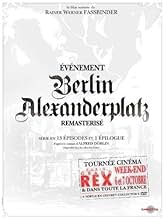Very long (15 hours in all), very worth seeing. Based on Alfred Doeblin's novel of the same name, "Berlin Alexanderplatz" is set in and around Berlin during the Weimar Republic era, the decade immediately preceding the establishment Hitler's Third Reich in 1933.
The workers of '20s Berlin are taking it on the chin. Mass unemployment reigns alongside the greed of the landlord and capitalist classes. People are reacting and acting in various ways to survive. As usual, some of the unemployed turn to crime; others to prostitution. Most of the film's cast will see the dawn of the "thousand year Reich" with their eyes only half way open.
But life must go on and it will go on and it does go on in Berlin during Weimar. It's an exciting time as well, a time when the puritanism of the countryside is being exchanged for a chance to live free and wild in a sleepless city chock full of cabarets and kniepe. Of course, the Nazis didn't like this and neither did their supporters, the conservative majorities of rural Germany.
As the film's director,R.W. Fassbinder put it,Doeblin's novel,BERLIN ALEXANDERPLATZ, "offered a precise characterization of the twenties; for anyone who knows what came of all that, it's fairly easy to recognize the reasons that made the average German capable of embracing his National Socialism."
All this turmoil and potential for explosive change are seen by the audience of "Berlin Alexanderplatz" through the eyes of one guy, Franz Biberkopf. Walk, ride, rob, love, drink and despair with Franz Biberkopf. Best bring along a case or two of good lager while you're immersing yourself in the prelude to "Gotterdamerung".


































